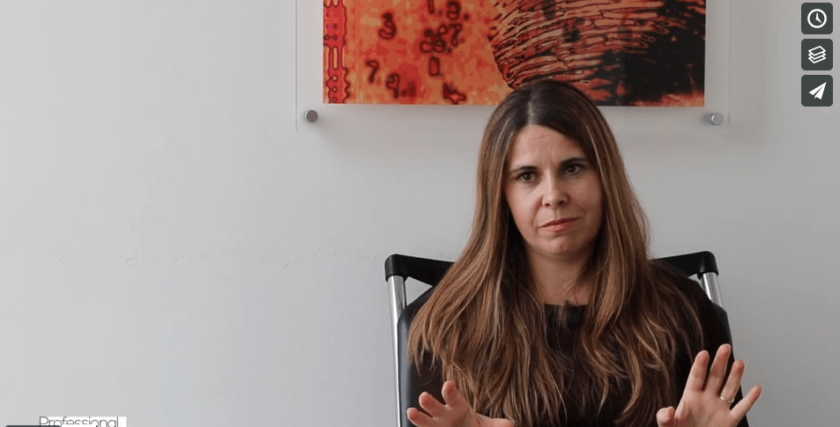Paraplanners have the power and ability to shape and develop the paraplanning profession, Elsa Ordonez Garcia tells Rob Kingsbury
Elsa Ordonez Garcia has a vision for the paraplanning profession. “My dream is that one day there will be a little boy or girl out there who says: ‘When I grow up I want to be a paraplanner’.”
The onus to make that happen, says the paraplanner with Mazars, lies with the paraplanning community.
“I think paraplanning will develop as much as paraplanners want to develop it. We need to take charge of our own future,” she says.
“There is a good community out there of paraplanners who see paraplanning as their career. We need to ensure more people recognise paraplanning as the valuable role it is and the important part it plays in creating financial plans for clients. We need to take responsibility for driving things forward.
“I hate it when people ask me what I want to do after being a paraplanner, as if it’s just a stepping stone to something else. I’m a paraplanner and paraplanning is my career.
“This is not to say that paraplanners shouldn’t go on to other roles (good people will attract good opportunities) but I’d like for paraplanning to be seen as a profession in its own right and I don’t think we have that at the moment.”
There is also a need for paraplanners to help bring new blood into the profession, she says. “We need to help spread the word about paraplanning outside of financial services. We can do that by getting out there, talking to schools, talking to universities and telling them about paraplanning and what it offers people coming out of education.
“No-one else is going to do all of that for us. But we can. What is great about paraplanning – what I see at all the paraplanning events I go to – is that there are people who are very committed to this profession and want to help drive things forward. That is fantastic.”
Checklists and processes
Elsa brings that passion for paraplanning to her work. “As paraplanners we have a massive role to play in terms of ensuring what goes to planner, to compliance and ultimately to the client, is correct and done to the best of our ability,” she says.
“We need to do things right and we need to prove that we have done them right. I want to know that what I do is good, that it is the best I can do. Which is why I like checklists. Having run compliance for adviser businesses I am a big fan of them.”
Putting together the right preparation and planning for each case is key to the way she works, she says. “If you follow a procedure and cover all the relevant points then you are more likely to produce a consistent result. If I’m doing something more than once then I like to document how it gets done. This is not just for my benefit but for anyone else who has to tackle that task in the future. I find that makes my life easier because everything flows better.”
As part of that preparation, she also advocates not being afraid to ask questions. “People might think I ask too many questions but I’d rather ask 100 questions before I start writing a report than to find out later that I haven’t got enough information so I have to go back and forth to the planner, interrupting them in what they are doing. I’d rather make sure I have everything I need up front.”
As part of the learning process, she is a keen advocate of paraplanners attending paraplanning-focussed events and networking with their peers.
“Being a paraplanner is much more than taking exams and qualifications. There are a lot of skills, especially the softer skills, that you get from experience and also from the wider community.
“Paraplanning events are where you get to share your experiences and discuss issues with your peers and where you realise you are not the only one who may be dealing with particular challenges.
You also you get good ideas and pointers on how other people have dealt with them.”
It is a practice she follows, attending as many events as possible, with the aim of taking away at least three or four action points to implement back at the office. “Sometimes it helps and sometimes it doesn’t but trying things out has really developed me as a paraplanner.”
Ex adviser turned paraplanner
Elsa joined Mazars in July 2017, working in the Milton Keynes office. Originally an IT trainer, helping firms train their staff to use new software, it was a chance opportunity to receive free financial planning training (FPC1) that saw Elsa move into financial planning. She took a trainee financial planner role in 2003, and then became a mortgage adviser.
She returned to her home country of Spain at the end of 2007, where she became a financial adviser to ex-pats for five years, working for two companies in that time. Her natural penchant for organising also saw her take on the role of office manager in both companies, organising the advisers around her and running the internal compliance process.
In 2013, she returned to the UK, to find that the Retail Distribution Review (RDR) had taken place. As she did not have the required Level 4 qualification, she started looking for roles as an office manager in financial planning firms, where she knew she could put her organisational skills to work.
“I was very lucky to find a financial planning firm that was willing to give me a chance, which was Vizion Wealth, and I stayed with them as their practice manager for four years,” she says.
As part of the role, she undertook the research and report writing for the advisers, and she also took her exams to become Level 4 qualified.
“I had never heard of paraplanning but within a few months of coming back into the country I went to a Paraplanners Powwow. It was only then that I realised how big paraplanning had become and also that the role which previously had often been given to me as part of my office manager duties as an administration task, was being recognised as a valuable role in its own right. I had thought I would go back into advising but the Powwow showed me that paraplanning could be the role for me.”
It’s a decision that has proved seminal for her, bringing her into a community that she says is inspiring. “What I like most about paraplanning is how energised and passionate paraplanners are about the profession and the feeling of community there is amongst paraplanners. Everyone is there to help one another. You can put out a question and someone will answer it. They are not getting anything directly from it, it’s about helping each other to become better paraplanners. That is so powerful in this industry.”
What is a typical day for Elsa?
Elsa splits her working week into two distinct areas of productivity – writing and non-writing days. “The reason I divide my time like this is because at Mazars we deal mainly with very complex and complicated planning, often involving a lot of strategy, and there are days when I need to lock myself away so I can be fully focussed on writing the report.”
The Mazars paraplanners have specific regions for which they provide cover. Elsa is responsible for Scotland, and is supported by graduate trainees within the team. All cases are listed on the internal system and more straight forward items, like ISA and protection cases, tend to be allocated to the graduates, while Elsa will tackle the more complex cases.
“I fully structure my report days. I’ll have booked in time with the planner early on so I can discuss the case with him, asking questions to ensure I have everything I need to get the report done. And, once I’ve done the report, I will put it to one side and allocate time to come back to it later with a fresh pair of eyes.
On average, due to the complexity of the cases, the paraplanners will write two reports a week. “We could be dealing with someone who has sold their business and so has a lot of money to be invested, which means we may need to look at every relevant wrapper, as well as protection and trust planning. You’re not going to get that done in a few hours,” she says.
On non-writing days, she will tackle emails, catch up on technical and industry matters, admin and CPD, and prepare presentations for the graduates’ training sessions, which the paraplanners undertake. “As paraplanners we also take it in turns to be available for a day so the graduates can come and ask questions of us.”
“On those days, usually, I’m a lot chattier in the office and people know they can interrupt me as much as they want,” she jokes.
Team ethos
The Mazars paraplanning team meet face-to-face on a regular basis. Rob Kingsbury attended a meeting to learn how the team worked together
Mazars Group is an audit, tax, accountancy, as well as advisory group, with some 18,000 professionals working in 19 countries through its member firms. The UK financial planning arm has 30 financial planners, 9 paraplanners and 14 graduates either in their first or second year of training.






























